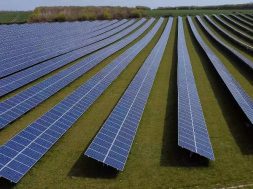
Research Study: MetaSOL Shatters Solar Panel Efficiency Forecasts with Innovative New Coating
MetaShield LLC, a market leader in advanced glass-based coating technology, today announced an independent research study indicating its proprietary MetaSOLTM nanotechnology coating can provide a 1.2 percent (absolute) efficiency boost for triple junction solar cells.
“The enhancement provided by MetaSOLTM represents a five-year technological leap forward based on recent yearly average increases of around .2% for solar PV module efficiency,” said Martin Ben-Dayan, MetaShield LLC’s founder and CEO, referencing a research report on solar cell efficiency improvements published by GTM Research in its PV Pulse publication in April 2014.
MetaSOLTM is a nanoparticle embedded glass-based coating that increases solar cell efficiency using advanced light trapping technology. The patent pending formula is spray coated directly onto the existing anti-reflective coating on the solar cells and hardens at room temperature, forming a transparent ~200nm glass film. The embedded nanoparticles employ strong forward scattering to affect optical enhancement in solar cells.
MetaShield commissioned the study with a grant from the Utah Science Technology and Research Initiative (USTAR) TAP program. The research was conducted at the MetaShield R&D facilities and verified by OAI-Optical Associates, a leading testing company in San Jose, Calif.
Key insights from the study concluded:
MetaSOLTM, when applied to triple junction solar cells, boosted their efficiency 1.2 percent (absolute). This increase amounts to the industry progress expected over five years by GTM Research, an analysis and advisory firm focused on the transformation of the global electricity industry, which predicted that efficiency of conventional solar panels is likely to improve by an average of about .2% annually.
In the study, triple junction GaInP/GaInAs/Ge solar cells, were coated with MetaSOLTM. The solar cells used were not encapsulated and already had commercial AR coatings. The current-voltage measurements (J-V curve) of the devices were measured under AM1.5 simulated solar spectrum illumination at OAI-Optical Associates, before and after the coating was applied. The comparison revealed an increase in device efficiency from 29.39 percent to 30.59 percent, an absolute increase of 1.2 percent.
Upon application, the product solidifies in air at room temperature and forms a thin film layer with refractive index of ~1.5. MetaSOL’s light-trapping coating employs plasmonic and dielectric nanoparticles to enhance the forward scattering of light incident on solar cells, and hence increase the short circuit current and the overall photo-conversion efficiency of these devices.
“MetaSOLTM is the result of several years of research and development,” said Glenn Mesa, MetaShield LLC’s director of R&D. “We’ve created a patented nanostructured composition that is capable of being custom infused with various nanoparticles, and forms a coating that is ultra-thin, ultra-light, with enhanced properties produced by the infused particles.”
According to Mesa, MetaSOLTM is in beta production and available to solar cell manufacturers. The tested solar cells, also known as triple junction photovoltaics, are primarily used for interstellar vehicles and communication satellites, although also used in solar “farms” to generate electricity and augment power plants; for off-grid power (traffic, emergency and construction road signs); and rooftop solar panels. Because of their use in space, solar cells must be highly efficient and lightweight.
MetaShield has begun testing MetaSOL’s ability to provide a similarly dramatic enhancement to crystalline silicon photovoltaic cells. “The findings thus far indicate that results will be as good or better for the type of PV cells which currently encompass 90% of the $90 billion+ global solar photovoltaics market, which is currently struggling with very narrow margins and desperate for innovative solutions,” Ben-Dayan said.
MetaShield will release the results of the crystalline silicon PV study upon its completion.
















